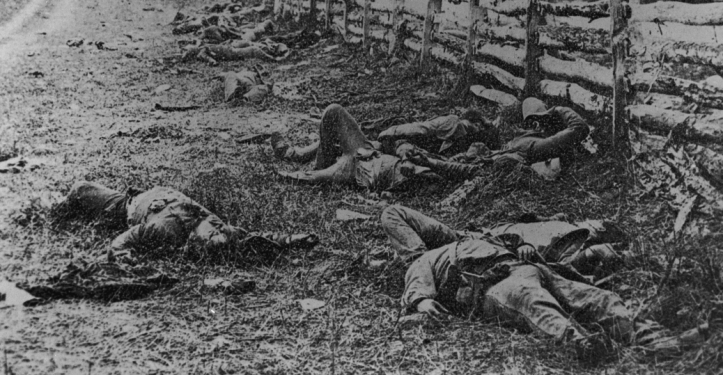
On September 17, 1862, the single bloodiest day in American history occurred outside a small town in Maryland. The Civil War Battle of Antietam–known as the Battle of Sharpsburg in the South–left roughly 23,000 Confederate and Union soldiers dead and wounded. More than double the amount of men died at Antietam in one day of violence than in the War of 1812, the Mexican-American War and the Spanish-American War combined. Although it was the Civil War, there were four times as many casualties than at the Normandy beaches on June 6, 1944.
Beyond the violence and the loss of life, it remains one of the most consequential days in American history, providing a turning point in the war for American identity.
The victory also gave President Abraham Lincoln the opportunity to issue the Emancipation Proclamation. Five days after the battle, Lincoln met with his cabinet and told them about the covenant he made with God. ”I think the time has come,” he said. “I wish that we were in a better condition. The action of the army against the rebels has not been quite what I should have best liked.” Lincoln then shared his plans to free the slaves on January 1, 1863. His remarks were met with overall support due to the strategic impact on the South’s war fighting capability. However, a few in the administration thought Lincoln’s decision could alienate slave holding states like Kentucky, Maryland or Delaware.
The optimism in the room was nonexistent a few weeks prior. Following Gen. George B. McClellan’s failure during the Peninsula Campaign, and “Stonewall” Jackson and Robert E. Lee’s rout of Gen. John Pope at the Second Battle of Bull Run , Union resolve had begun to wobble.
“The nation is rapidly sinking now,” wrote a New York diarist after the Second Battle of Bull Run. “Stonewall Jackson (our national bugaboo) is about to invade Maryland, 40,000 strong. General advance of the rebel line threatening our hold on Missouri and Kentucky. Cincinnati is in danger… Disgust with our present government is certainly universal.”
Meanwhile, Lee saw an opportunity to strike a devastating blow to a beleaguered army. Shortly after his victory at Second Bull Run, Lee made his way North into Maryland, where Southern sympathies remained strong. Lee believed another victory might convince Northerners to vote for Peace Democrats in the upcoming 1862 elections. A good showing by Peace Democrats could provide the opportunity for a negotiation that recognized Southern independence. Moreover, a successful victory could finally push European powers into acknowledging the Confederacy. Believing the Union Army was in a weak and vulnerable state, he pushed across the Potomac River, cutting off the capital from the B&O railroad and threatening Pennsylvania.
It was a bold strategy. Fortunately for the Union, a stroke of tremendous fortune appeared. In a field near Frederick, Maryland, two union soldiers found a copy of Lee’s orders wrapped around three cigars. Gen. McClellan immediately understood its significance.
“Here is a paper with which if I cannot whip ‘Bobby Lee,’ I will be willing to go home,” he said.
The battle erupted in the morning shortly after the fog cleared. The Confederates were hungry and tired from marching, but fought intensely. On the other side, the Union Army fought with renewed determination. For five hours, a bloody battle ensued, leaving more than 12,000 men dead and wounded. Later, some of the most violent fighting occurred on Burnside’s bridge, which saw both Army’s charge at each other while taking heavy losses.

Lee’s Army was nearly ruined, but McClellan was too disturbed by Union losses to finish them. On the following day, both armies remained quite, refusing to test each other after a brutal exchange. Finally, Lee withdrew his troops back South to Virginia in the evening.
While Lincoln could have freed the slaves before Antietam, it would have risked alienating Southern sympathizers in Union territories, like Maryland. Furthermore, Lincoln’s cabinet wanted him to hold off on creating the executive order until a major victory could negate any claims of desperation. Ironically, Lincoln’s proclamation didn’t free slaves in Maryland—one of a handful of slave states that had remained in the Union—since it only applied to slaves in rebel states.
Any hopes of a European alliance with the Confederacy were erased following Antietam. Most importantly, the victory provided voters with a solid reason to give Lincoln and the Republicans, as well as pro-Union Democrats, control of the House.
The midterm assured the sacrifice at Antietam and other battles would not be lost in vain.